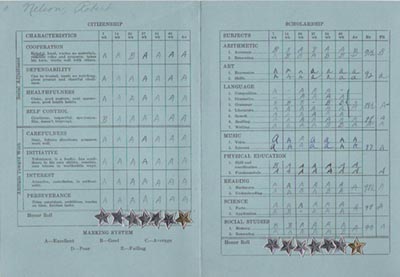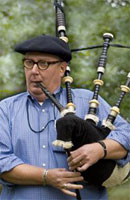|
 |
| Teachers.Net Gazette Vol.6 No.3 | March 2009 |
Subscribe for free home delivery |
|
Old School Progress Reports Some things never change. A progress report form is still an expression of a school community’s values and relationships, as well as individual achievement. | ||
| by Todd R. Nelson Regular contributor to the Gazette March 1, 2008 |
||
|
If you were a fourth grader at the Eggertsville Elementary School in Eggertsville, New York, in the early 1940s, citizenship occupied fully half of the small blue report card that you took home to your parents at the end of each marking period—six times a year. Citizenship was complicated! It was divided into two parts: Social Adjustment and Attitude Toward Work, both categories detailed in subcategories: cooperation, dependability, healthfulness, self control; carefulness, initiative, interest, and perseverance, respectively. Even the sub-categories had sub-categories. The standards were clear and concise; the routine rigid; the document short and graphic. And there were silver stars to be earned, as well as letter codes: U, I, S, H! Over on the “Scholarship” side of the blue card, the headings listed the academic subjects without sub-categories. Everyone seemed to know what was included in math, science, language arts. There were the traditional letter grades for each subject, and an average grade for the year. Stapled inside, was a very small blank piece of paper with room for the teacher’s “remarks,” if they chose. “Bob did some fine work on the original Columbus Day play,” wrote Mrs. Shurgot. The year before: “Bob did some good acting in the class Thanksgiving play,” and in the Christmas assembly, “he showed more of his good work on the stage by the fine reading of his topic and poem.” I suppose we would call these “narrative comments” today. What was the name of that poem? What made his work on the play “fine”? It feels like incomplete reporting. There’s no directive information in them for the next marking period. The Eggertsville card also contains one brief, statement of mission: “When the school and home unite in their efforts the best interest of the child can be served. The closest cooperation of these two forces is essential for the pupil’s development.” So, it’s a progress report! But what a starchy declaration of interdependence. At any rate, young Bob took that card home six times and returned it to school with his mother’s signature. He was promoted to fifth grade, with many silver stars attached for good attendance, honor roll, band, music, newspaper. Evidently Bob’s mom valued her son’s record of achievement and saved all his report cards. They were preserved for posterity. Bob’s mom was June Nelson, my grandmother, and I hadn’t seen these historic artifacts until Thanksgiving, when we had a good laugh over dad’s academic record around the family table. | ||
|



 Todd R. Nelson has been a public and private school English teacher and administrator for 29 years, in schools in Cambridge, San Francisco, Chicago and Maine. He is principal at the Adams School in Castine, Maine, a 54 student K-8 school on the town common in a little town on the coast, where he gets to play four-square at recess, play his bagpipes, and write musicals for the all-school play.
Todd R. Nelson has been a public and private school English teacher and administrator for 29 years, in schools in Cambridge, San Francisco, Chicago and Maine. He is principal at the Adams School in Castine, Maine, a 54 student K-8 school on the town common in a little town on the coast, where he gets to play four-square at recess, play his bagpipes, and write musicals for the all-school play.